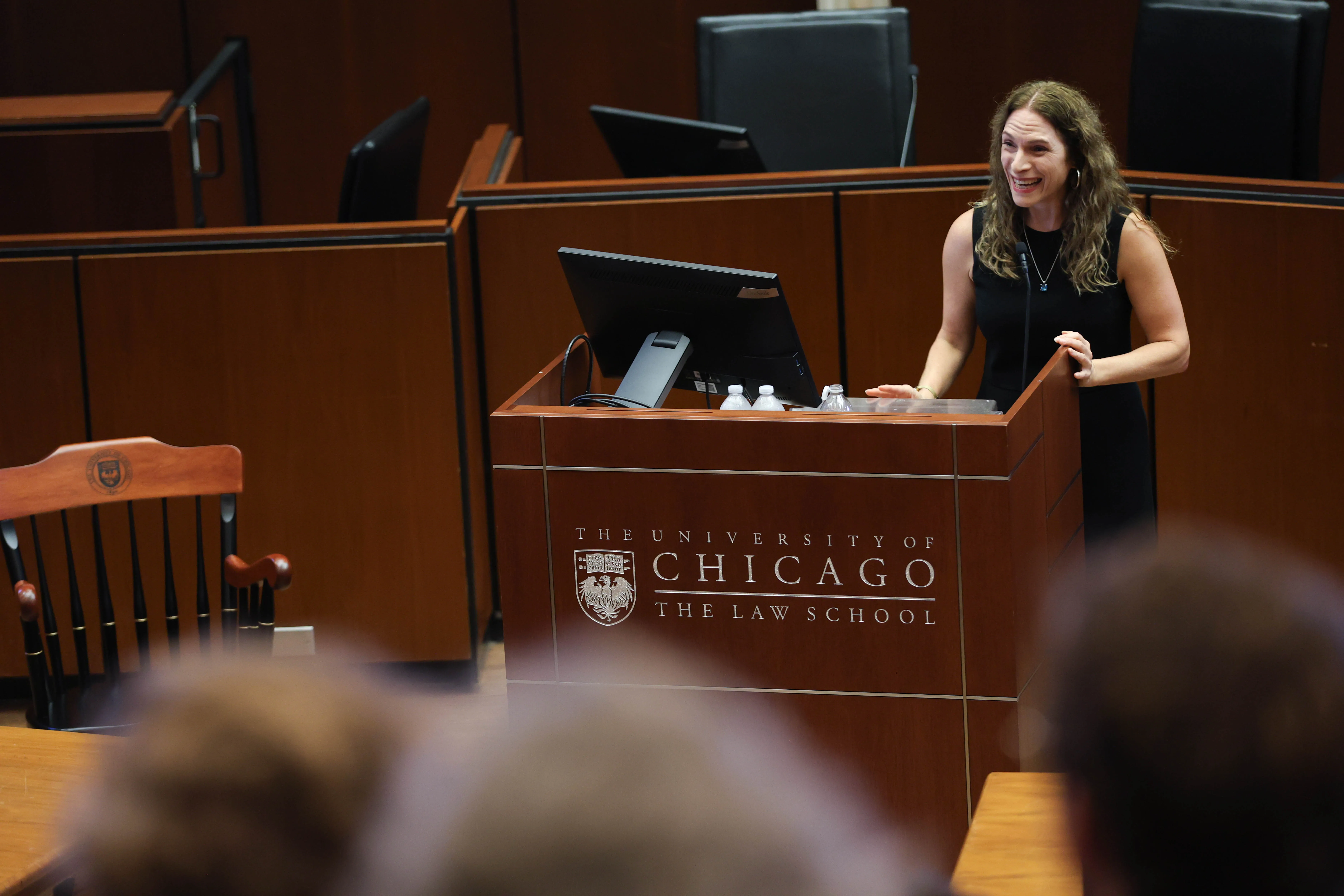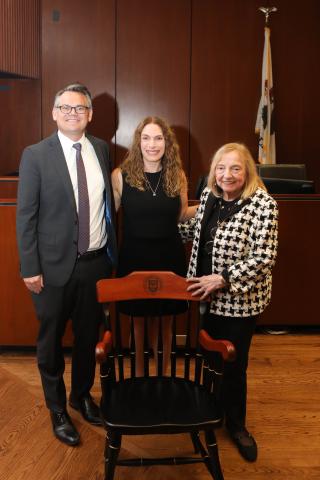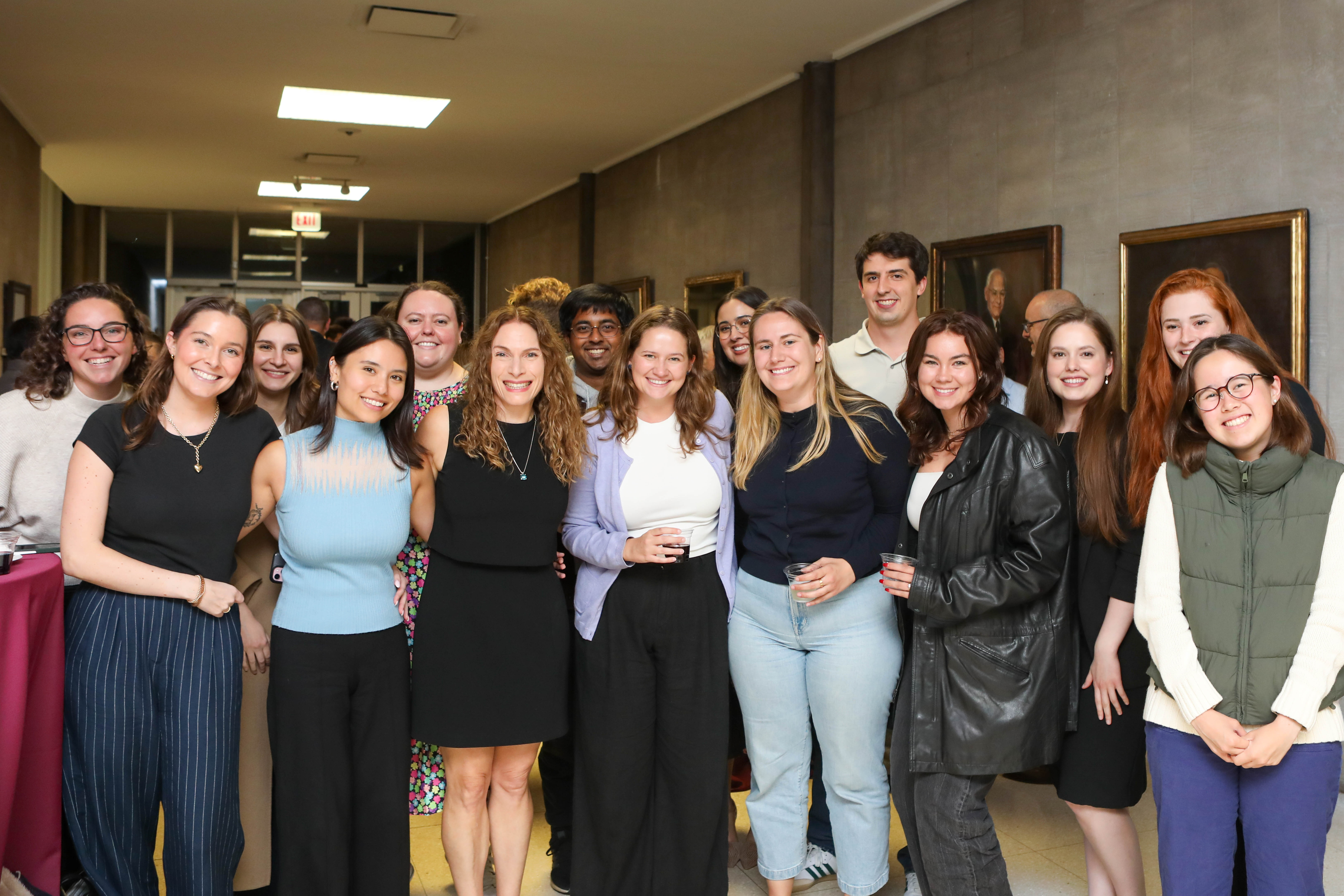Alison Siegler Delivers Inaugural Endowed Chair Lecture on Transformative Advocacy and the Fight to Restore the Rule of Law

At the Endowed Chair Lecture marking her appointment as the Lillian E. Kraemer Clinical Professor in Public Interest Law, Alison Siegler shared the story of the Freedom Denied project, a seven-year, student-led investigation and advocacy effort. The project uncovered widespread violations in the federal bail system and helped realign courtroom practices nationwide with the rule of law.
Siegler, founding director of the Federal Criminal Justice Clinic (FCJC), delivered the first Endowed Chair Lecture in the Law School’s history on October 14. Her lecture, “Freedom Denied: The Fight to Restore the Rule of Law in the Federal Bail System,” drew students, faculty, alumni, and distinguished guests, including Kraemer, ’64, herself. The event was both a celebration of Siegler’s appointment and a reflection on the FCJC’s commitment to using rigorous, evidence-based advocacy to effect systemic change.
Dean Adam Chilton noted that the Kraemer Chair is the only endowed chair at the Law School held by a clinical faculty member. “An endowed chair is a sign that the work that [you’ve] done and the contributions [you’ve] made are worthy of the University’s highest honor,” he said. “Here at the Law School, we are incredibly proud of the work led by Alison and her clinic. The impact of their advocacy has changed the face of the legal system. This is exactly the kind of public interest work that the Kraemer Chair envisions to inspire.”
“It’s extremely humbling to hold a chair in Lillian Kraemer’s name because she is truly an extraordinary trailblazer,” Siegler said. “In keeping with Ms. Kraemer’s vision for the chair, my Federal Criminal Justice Clinic also aims to inspire students, support public service, and ensure adherence to the rule of law—especially for the people with the least power.” The FCJC, founded by Siegler in 2008, was the first law school clinic in the country dedicated to representing low-income clients charged with federal felonies.
Exposing a National Crisis
Siegler opened her lecture with a story about a man forced to represent himself at his first federal court hearing—a blatant violation of federal law. A student court-watcher from the FCJC witnessed the incident and was shocked to see the rule of law subverted before his very eyes.
The hearing showcased a staggering federal access-to-counsel problem that became one of the focal points of the Freedom Denied Project, the first comprehensive national investigation of the federal pretrial detention system.
“We discovered that over the past two decades, 30 federal courts routinely deprived people of counsel during initial appearance hearings,” Siegler said. “That’s one-third of the 94 federal courts.”
Through watching hundreds of court hearings and interviewing scores of judges and lawyers nationwide, Siegler and her students uncovered four systemic crises, two of which she highlighted in her lecture: Defendants were being locked in jail at initial bail hearings without lawyers to represent them, and judges were jailing people at those hearings without statutory authority.
These findings became the foundation of the clinic’s 300-page report, Freedom Denied: How the Culture of Detention Created a Federal Jailing Crisis—an unprecedented, data-driven analysis that catalyzed reform across the country.
Transformative Advocacy Within All Branches of Government
Siegler’s clinic emphasizes what she calls “transformative advocacy,” which involves moving beyond “one-client, one-case” litigation to explore new and powerful ways of advancing systemic change. Once she and her students learn of and investigate a systemic crisis, “we pull every possible lever to fix it.”
“Discovering and exposing the legal violations was just the beginning,” said Siegler. “The next challenge was to develop transformative advocacy interventions to realign courtroom practices with the rule of law.”
For the Freedom Denied project, that meant working with all three branches of government to restore lawful practices.
To address the right-to-counsel problem, Siegler and her students engaged the Department of Justice, which added a new directive to its Justice Manual—the “bible for federal prosecutors”—affirming that federal law requires every defendant to be represented by counsel during initial appearance hearings. They then approached the Judicial Conference of the United States, chaired by Chief Justice John Roberts, about the problem. In 2024, the Conference issued a national right-to-counsel directive requiring every federal court in the country to comply with the law and guarantee counsel at pretrial hearings.
“The interventions we’ve led have resulted in widespread and concrete change,” Siegler explained. “Of the 30 courts where the problem existed, 20 have instituted reforms and are now appointing counsel to represent every single person at initial appearance hearings. This was after decades of violating the law.”
To address misunderstandings around the bail statute’s legal standards, Siegler testified before Congress and worked with students and Clinical Professor Erica Zunkel to draft legislation to reform the federal pretrial detention system. The clinic’s litigation team also created and distributed model motions—now published on Westlaw—to prevent unlawful pretrial detention.
Judges across the country have since agreed with the Freedom Denied report’s approach to the bail statute and have cited the report in opinions restoring statutory safeguards. In a reform reflecting the clinic’s advocacy, the federal judiciary recently revised its official detention order form to ensure that judges document legal grounds before detaining anyone pretrial.
“This change will ensure adherence to the rule of law for the approximately 65,000 people charged every year in the federal system,” Siegler said.
A Legacy of Student-Led Reform
Siegler emphasized that her students’ research, advocacy, and tenacity drove every stage of the project. “The win is not mine; it’s the students’ and the clinic’s,” she said.
Of the more than 50 clinic students who worked on the Freedom Denied project, many have gone on to clerk for federal judges, serve in public defender offices, and pursue public interest and government careers—embodying Kraemer’s vision for the professorship.
Kraemer, a pioneering attorney who led Simpson Thacher & Bartlett’s bankruptcy practice during her three-decade career, endowed the chair to champion public service and ensure that “our best lawyers remain keenly aware of their public responsibilities.”
Siegler closed with a message for students and future lawyers: to challenge accepted practices and defend justice wherever it falters.
“Each and every one of you can engage in transformative advocacy in big and small ways. You have the courage to take action, the creativity to identify the levers to pull, and the tenacity to surmount any obstacles you encounter,” she said. “Just because everyone else is doing something one way doesn’t make it OK. With the rule of law as your touchstone, you can right wrongs and transform the system.”



